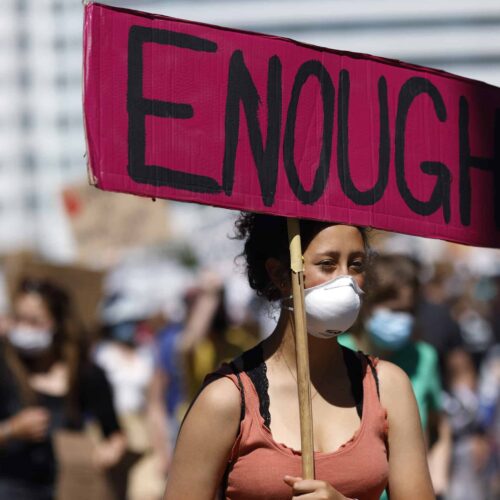Introduction
Hi Watchdogs, and welcome back to your favorite newsletter. 👋 We hope you’re staying safe while enjoying some sunshine. We’ve been hitting the pavement, photographing protests in D.C.
Here’s what we have for you this week:
- Some possible solutions to improve policing, according to advocates.
- A new report on unemployment among Latina workers –– the group most affected by job loss amid coronavirus.
- Plus, we break down what happened with the Georgia primary.
Let’s get into it.
Policing the police: Advocates are fighting to improve the way communities are policed. One of the solutions may include investing less in public safety and more in services that strengthen neighborhoods, such as housing and healthcare, aka “defunding the police.” But there’s another component that some folks on the ground want as part of the reform narrative.
Civilian oversight boards: More than 140 civilian review bodies operate nationwide, but the influence they have over police varies –– many of them don’t have much. Advocates are continuing the decades-long fight for oversight with some teeth.
What stands in the way of that? Surprise! It’s usually the police.
Case in point:
📍Nashville, Tennessee: The city’s civilian oversight office was born via a ballot measure in 2018, despite more than $500,000 in spending to defeat the proposal by the local police union, the Tennessean reported.
📍 Newark, New Jersey: In 2016, the city created the Civilian Complaint Review Board decades after the first calls for one. The local police union sued to weaken its powers. The state’s Supreme Court will have to resolve that fight.
📍 Tulsa, Oklahoma: Union officials pushing back against proposals for an oversight body said the City Council provided enough oversight and criticized the independent police monitor office in Denver, Colorado, which the city’s mayor and police-reform activists looked to as a guide for building their own.
More here on the challenges (and successes) in the long battle for civilian oversight of the police. (Tweet this story)
Related: Camden, New Jersey, the city that really did abolish the police (via POLITICO)
Meanwhile, in coronavirus news: Last week’s jobs report by the Bureau of Labor Statistics showed companies began hiring again in May, adding 2.5 million jobs. Still, Latinas are the hardest hit by the COVID-19 economic slowdown.
Economists say the disparity comes from institutional barriers that limit Latinas to the lowest paid service jobs, which typically require close contact with people. (Tweet this story)
Not-so-fun fact: In some states, you can play golf but you can’t see your kids in foster care. #Priorities, I guess. Some states have started reopening but continue to ban visitations. Our survey found 20 states restricted visitation of children in foster care.
Case in point: In Illinois, visits that are supervised by social-service staff are not allowed, even though hair salons and churches reopened in addition to golf courses. Read our full investigation here. (Tweet this story)
What we’re following:
🔮 Could Georgia’s primary be a peek into November’s general election? It was clear that officials were unprepared for an election on new voting machines during the coronavirus pandemic. Poll workers couldn’t get them to work, and social distancing requirements created long lines. Some voters gave up and went home. (via Atlanta Journal Constitution)
President Trump is facing backlash for his next rally in Tulsa, Oklahoma, the historical site of a race massacre on June 19 or Juneteenth, the day news of emancipation reached slaves in Texas. (via NPR)
Related: Tulsa World has a great resource for learning about the race massacre that happened there.
#humblebrag: We just won two Dateline Awards from the D.C. chapter of the Society of Professional Journalists 🎉Congrats to our Editor-at-large Dave Levinthal who won the beat reporting award for his articles unveiling truths about Trump’s political and personal finances, and Susan Ferris for her immigration blog Immigration Decoded.
Award-winning journalism takes resources. Chip in to help our reporting.
We can’t do this work without your support.
We’re continuing our series featuring journalists who have written powerful stories. This week, we spoke to Melissa Segura about her timely BuzzFeed News piece, which lays bare the connection between police unions and police brutality in the U.S. Her colleague’s analysis found that nearly 90% of the 240,000 complaints against Chicago officers from 1967 to 2016 resulted in no disciplinary action — and that’s when she really started to dig in. She learned that the system’s failures weren’t a quirk, but a feature designed to protect police over the public.
What led you to pursue the story?
In 2017, I published an investigation about how a single Chicago detective had been accused of framing more than 50 people for murders they didn’t commit. Though the story focused on one detective, I wanted to show readers exactly how, where and why various oversight mechanisms failed — decade after decade — to stop the detective from destroying the lives of so many he’d been charged with protecting.
In the course of that investigation, I learned anything and everything I could about how disciplinary systems within the Chicago Police Department worked. I learned that they mostly didn’t.
Now, when I see a high-profile incident involving an officer with a questionable complaint history, my first question is always about the disciplinary procedures in place. That was the same question that immediately popped to mind when I read about Minneapolis police officer Derek Chauvin’s record on the force.
How did you get the story?
Over the last year or so, I kept seeing more and more inflammatory social media posts from union leaders and stories about leaders defending officers in what seemed like indefensible behavior. In Chicago, the union had gone as far as making up these strange conspiracy theories to defend the officer I’d investigated. Over the last year, I had kept a file of interesting union stories in hopes of doing an in-depth story.
Then images of Derek Chauvin killing George Floyd appeared on everyone’s screens.
When I read that Mr. Chauvin had 17 (or so) complaints in his file, it was simply pattern recognition.
Where do you look for inspiration?
On a macro perspective, I look to my family and my own community. I’m a mestiza — a combination of Spanish conquerors and Native slaves — from Northern New Mexico. My history is that of both the conquered and the conqueror. That duality, that history, has left me dancing across the hyphen of identities all my life. I’m a both and neither. That’s my superpower — that I’m an outsider, which means I sit in the back corner and just listen.
Takeaway: When writing about inequality, look towards the bigger systems at work.
📚What we’re reading:
- The 13th amendment could end racist policing (via Slate)
- The police have been spying on Black reporters and activists for years. I know because I’m one of them. (via ProPublica & MLK50)
- Tou Thao’s role in George Floyd killing has Sacramentans discussing Hmong-black relations (via The Sacramento Bee) (Shout out to our former intern, Ashley Wong, who wrote this powerful piece.)
P.S. If you want more insight about race and current events, our CEO Susan Smith Richardson, breaks it down in our new newsletter The Moment. Look out for our next edition.
That’s all we have for you this week, folks. With restaurants opening up, are you cool with outdoor dining? Reply to let me know. See you next week.
Read more in Inside Public Integrity
Watchdog newsletter
Words matter: Was the attack on the Capitol a rally, protest or insurrection?
The question remains how history will record the events that resulted in mayhem at the U.S. Capitol.


Join the conversation
Show Comments